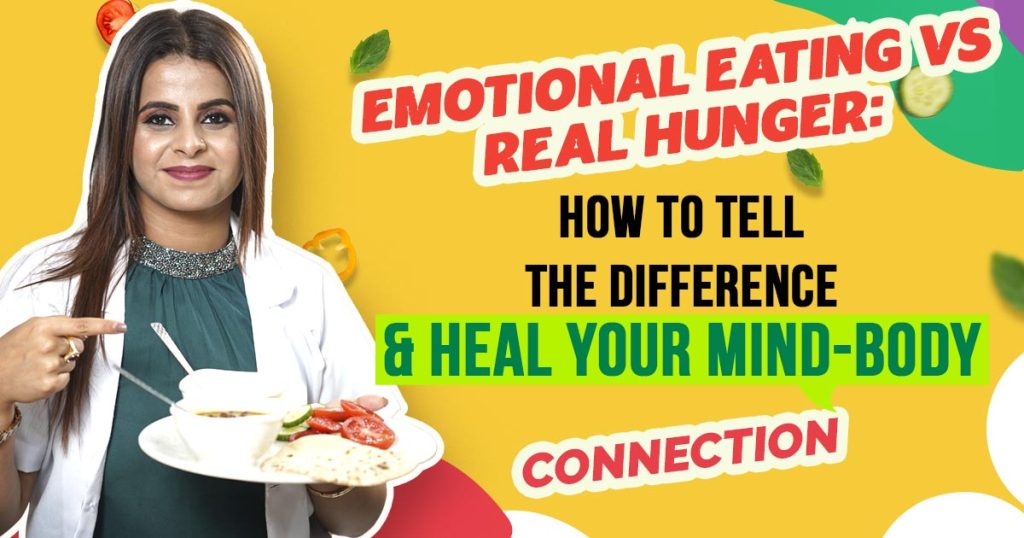
Emotional Eating vs. Real Hunger: How to Tell The Difference And Heal Your Mind-Body Connection
- Dietitian Sheenam
- April 22, 2025
Can hunger be of different types? Definitely yes. Physical hunger is the body’s need for energy and nutrition. It develops gradually and is satisfied by nutritious foods. It is often accompanied by physical sensations like a growling stomach. Emotional Eating is driven by emotional needs which can vary from boredom to stress. Unlike physical/real hunger,it arises suddenly and it is generally satisfied by comfort foods which the person is craving for. Also, emotional hunger is not only satisfied by food but it requires distraction from feelings and emotional satisfaction. Let us understand the difference between physical and emotional eating in detail:
The Difference Between Emotional Eating And Physical/Real Hunger
To break the cycle of emotional eating, you must understand the difference between emotional eating and real hunger. Although it is not as easy as it sounds, there are some signs that can help you know the difference.
- Emotional hunger feels instantly and you feel the need to satisfy it urgently. It is overwhelming. On the other hand, physical hunger builds up gradually but it doesn’t desire instant satisfaction. It depends on how much time before you have had your food.
- In a physical hunger, foods like vegetables and healthy options also sound good but emotional hunger only craves for junk food and nothing else satisfies you other than a particular snack.
- Emotional hunger leads you towards overeating without being aware. You do not surely enjoy the food but just eat up mindlessly to relax the rushing emotion in you. When you eat for physical hunger you are aware of what and how much you eat.
- Growling stomach is a sign of physical hunger, which you do not feel in emotional hunger. You just crave for specific textures, smells and tastes for food and everything feels like it is getting up on your head.
- If you feel guilty or regret after eating, it means you know that you were doing emotional eating and not to complete your nutritional needs.
Once you understand these, Know yourself if you are an emotional eater by questioning yourself these:
Are You An Emotional Eater?
- Do you eat more when you’re feeling stressed?
- Do you eat when you’re not hungry or when you’re full?
- Do you eat to feel better (to calm and soothe yourself when you’re sad, mad, bored, anxious, etc.)?
- Do you reward yourself with food?
- Do you regularly eat until you’ve stuffed yourself?
- Does food make you feel safe? Do you feel like food is a friend?
- Do you feel powerless or out of control around food?
Overcoming emotional eating can be tough if you don’t know how it arises and what to do when it triggers. Following some easy steps can help you a lot.
How To Overcome Emotional Eating?
- Identify the triggers for your emotional eating: Whenever you feel like eating but you had your food some time ago, consider if any situation, place or feeling made you emotional and you are looking for food to comfort yourself. Once you find this, you are a step closer to overcoming emotional eating.
- Mostly, emotional eating is linked to negative or unpleasant feelings but sometimes, you can crave for food as a reward for success or any other happy event. It is also known as emotional eating.
- Common causes for emotional eating are: Stress, boredom or feeling of emptiness, stuffing emotions, childhood habits, social influence. Know yourself better by taking care of such situations and avoiding overeating.
Conclusion
We don’t eat food just to fill our stomachs. As an Indian, we understand that food has a special connection with us. We celebrate through food, we show our care by cooking for someone and we share our food to connect with others. So, if you find yourself an emotional eater, always make a conscious decision about when, what and how you are eating. You will understand your body better and choose the healthy options once you acknowledge emotional eating and how to overcome it.
If you are not sure whether you are stuck in the cycle of emotional eating and guilt, you can always consult the best dietician in Punjab. She can help you identify the signs and guide you to overcome emotional eating effectively.
Also Read:
Tags
Share This
Recent Posts
Categories
- Anti-Inflammatory Diet (1)
- Balanced Diet Meal Plan (1)
- Belly Fat (1)
- Blood Pressure (2)
- Bridal Diet Plan (1)
- Clinical Nutrition (4)
- Constipation Remedies (1)
- Detox (3)
- Diabetes (1)
- Diet Planning (1)
- Diet Plans (12)
- Dietitian (1)
- Disease Management (1)
- Eating (1)
- Exercises (1)
- Foods (3)
- Glowing Skin (1)
- Healthy Hair (1)
- Healthy Recipes (5)
- Irregular and Scanty Periods (1)
- Low Sodium Diet (1)
- Medical Nutrition Therapy (1)
- Metabolism (1)
- Natural Remedies (2)
- Nutrient Deficiency (1)
- PCOD/PCOS (2)
- Sleep (1)
- Thyroid Health (2)
- Uncategorized (1)
- Weight Loss (7)
- Women Health (1)


